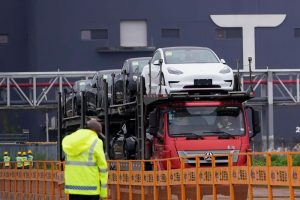Australian company Lynas Rare Earths got lift on Thursday from China’s restrictions on exports of critical minerals, with its shares shooting up by close to 12%.
Shares of Lynas – the world’s largest rare-earth producer outside China – hit their highest level in over two years after automakers around the world voiced fears that China’s export controls could spur production delays.
The group is expected to benefit from concerns over global supply stability. Analysts say rising geopolitical tension and strong demand for critical minerals could create favourable conditions for Lynas, which has its head office in Perth and is listed on the Australian Stock Exchange.
ALSO SEE: Cloud on US-China Ties: Trump Says Xi ‘Hard to Make a Deal With’
Lynas’ stock jumped as much as 11.8% to A$9.20, touching its highest level since February 8, 2023. The move also marked the stock’s biggest intraday percentage gain since October 24, 2023.
“Lynas’ rally … is a powerful reflection of the dual drivers at play today: escalating geopolitical tensions and surging demand for green technology,” Hebe Chen, a market analyst at Vantage Markets, said.
“As China tightens rare-earth export controls, markets are pricing in supply risks — positioning Lynas … as a strategic hedge.”
China, which accounts for about 90% of global rare-earth production, imposed export restrictions in April on the strategic minerals in response to tariffs introduced by US President Donald Trump.
Officials in the US said their Chinese counterparts agreed to lift export controls imposed on critical minerals as part of the trade agreement made with the US in Geneva on May 12, but later reneged on the deal because the White House began imposing further curbs on other sectors when they saw Beijing had failed to comply with the agreement.
European carmakers voice concern
The move raised alarms across industries reliant on the 17 rare-earth elements, which are critical for defence systems, electric vehicles, clean energy, and advanced electronics.
This week, German automakers added urgency to those concerns, warning that China’s export restrictions on rare-earth materials pose a significant threat to their production lines and local economies.
Europe’s auto supplier association CLEPA said several production lines have shut down after running out of supplies, while Mercedes-Benz said they were talking to top suppliers about building “buffers” such as stockpiles to protect against potential threats to supply.
Although rare-earth elements are relatively common in the earth’s crust, China dominates the global supply chain by mastering the complex and environmentally challenging refining process.
The US has only one operational rare-earth mine, but the bulk of its output is still shipped to China for processing, underscoring the strategic importance of non-Chinese producers such as Lynas.
- Reuters with additional editing by Jim Pollard
ALSO SEE:
Carmakers Stressed by China’s Curbs on Critical Mineral Exports
China ‘Totally Violated’ Tariffs Agreement With US, Trump Says
Shipments of US Ethane to China Face Export Licence Uncertainty
US Blocks Chip Design Software, Chemical Shipments to China
Beijing Says Latest US Chip Warning Puts Trade Truce at Risk
Mass Layoffs Avoided in China, But Export Sector Badly Shaken
Asian Markets Rise After US, China Agree to Cut Majority of Tariffs
China Follows US Playbook in Rare Earth Crackdown; Tesla Hit
China Halts Rare Earth Exports, Warns US on Deep-Sea Metals ‘Plan’
China Plunders Rare Earth Minerals as Myanmar’s Civil War Rages























